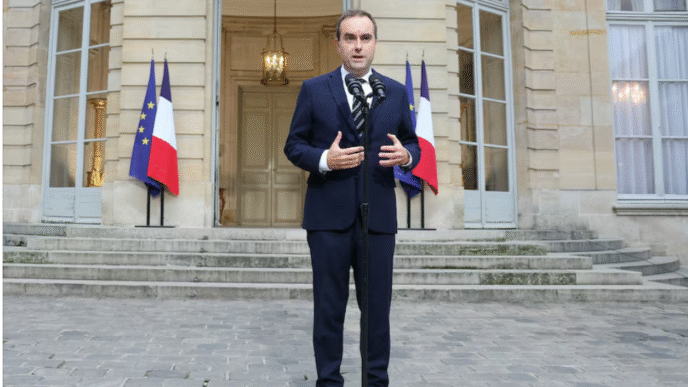The leader of the UK’s Conservative Party, Kemi Badenoch, has set out a sweeping new immigration policy that she describes as the “toughest reforms Britain has ever seen.” The proposal, dubbed the Radical Borders Plan, is designed to deport 150,000 illegal migrants every year while fundamentally restructuring the country’s border enforcement system.
In a video message shared on her X (formerly Twitter) account on Sunday, Badenoch said the plan is necessary to restore order to Britain’s borders and rebuild public confidence in the immigration system. At the heart of her proposal is the creation of a new Removals Force, modelled after the United States’ Immigration and Customs Enforcement (ICE), which would focus exclusively on identifying, detaining, and deporting those in the UK illegally.
“This country has been failed by decades of weak immigration policies,” Badenoch said. “The British people have been clear: they want secure borders, fairness, and the rule of law. That means removing those who have no right to be here.”
The Core of the Radical Borders Plan
Badenoch’s plan introduces a multi-pronged approach to tackling irregular migration. Key components include:
- Mass Deportation Targets – An ambitious target of 150,000 deportations per year, significantly more than current levels, which average fewer than 20,000 removals annually.
- Creation of the Removals Force – A dedicated enforcement body with nationwide powers, specialist training, and advanced technology, similar in function to ICE in the United States.
- Expanded Detention Facilities – Construction of new centres or reopening of mothballed sites to hold migrants awaiting removal.
- International Return Agreements – Partnerships with countries willing to accept deported nationals, including possible third-country processing models similar to the Rwanda scheme.
- Tougher Border Controls – Enhanced biometric checks, digital entry/exit tracking, and increased maritime patrols to stop illegal arrivals before they reach the UK.
- Overhaul of Asylum Appeals – Curtailing lengthy and costly legal challenges that, according to Badenoch, have “clogged the courts and rewarded those who game the system.”
Context: The Scale of Irregular Migration in the UK
Immigration has become one of the most divisive issues in British politics. In recent years, the UK has faced rising numbers of people arriving illegally across the English Channel, as well as thousands who overstay visas each year.
- Small Boat Crossings: Since 2018, more than 120,000 people have arrived in the UK by small boats, often crossing the Channel from France. In 2022 alone, more than 45,000 people made the journey — a record high.
- Deportation Figures: Despite these rising numbers, annual deportations have fallen sharply. In the early 2010s, the UK was removing more than 40,000 people a year. By 2022, that number had dropped below 20,000.
- Backlog: The asylum system has been overwhelmed, with a backlog of more than 175,000 applications by mid-2023. Many asylum seekers remain in limbo for years, housed in temporary accommodation at taxpayer expense.
Badenoch argues that these statistics reflect a “broken system” that rewards illegal entry and leaves Britain unable to control who comes in and who stays.
Comparisons to Previous Conservative Immigration Policies
Badenoch’s plan represents an escalation in Conservative immigration policy, which has evolved significantly over the past decade.
- Theresa May and the “Hostile Environment”: As Home Secretary, May introduced policies aimed at making life in the UK difficult for illegal migrants, but critics say it also unfairly targeted legal residents, culminating in the Windrush scandal.
- Boris Johnson’s Points-Based System: Johnson introduced a post-Brexit immigration framework that prioritised skilled workers but faced criticism for failing to address illegal migration and small boat crossings.
- Rishi Sunak’s Rwanda Plan: Sunak pursued a controversial agreement to send asylum seekers to Rwanda for processing. Years of legal challenges delayed the scheme, raising questions about its effectiveness as a deterrent.
By contrast, Badenoch’s Radical Borders Plan moves away from one-off schemes and instead focuses on building a permanent enforcement infrastructure to deliver large-scale annual deportations.
Political Messaging: “Fairness and Sovereignty”
Badenoch is framing the immigration debate around two core themes: fairness and sovereignty.
She argues that illegal immigration undermines the rights of those who follow legal routes, burdens taxpayers, and strains public services such as housing, healthcare, and education. She also links the issue to sovereignty, saying Britain must reclaim control over its borders after decades of reliance on European and international frameworks.
“Britain will decide who comes here, not the people smugglers and not the courts,” she declared. “We will be firm, fair, and unapologetic in protecting our borders.”
The plan also seeks to reassure the public that legal migration — for skilled workers, students, and genuine refugees — will remain part of Britain’s system, but only under strict control.
Challenges and Criticisms
While the Radical Borders Plan has energised Conservative supporters who want a tougher stance on immigration, it faces significant hurdles.
- Logistical Feasibility: Deporting 150,000 people annually would require vast resources. Detention capacity, chartered flights, and international agreements would all need major expansion.
- Legal Barriers: Human rights laws, asylum obligations, and international treaties could constrain the government’s ability to implement mass deportations.
- Cost: Building detention centres, funding a new enforcement force, and sustaining large-scale deportations could run into billions of pounds. Critics argue the costs may outweigh the benefits.
- Diplomatic Pushback: Securing agreements with countries to accept large numbers of deportees may prove politically difficult, especially with states reluctant to cooperate.
- Humanitarian Concerns: Rights groups warn that such measures risk violating international protections for refugees and could lead to wrongful deportations.
Support and Opposition
- Supporters: Many Conservatives see the Radical Borders Plan as a bold and necessary reset. They argue that previous leaders have failed to deliver, and only a radical overhaul can restore order to the system. For some voters, Badenoch’s tough stance could be decisive in rebuilding trust in the party.
- Opponents: Labour, Liberal Democrats, and the Scottish National Party are expected to strongly oppose the plan, framing it as cruel, unrealistic, and legally unsound. Rights organisations say it will criminalise vulnerable people and tarnish Britain’s reputation internationally.
Broader European Context
Badenoch’s announcement comes at a time when immigration is shaping politics across Europe. Several EU countries, including Italy, Greece, and France, have introduced tougher measures against illegal migration amid rising public concern. In Germany and Sweden, debates around deportation and integration dominate political discourse.
By drawing inspiration from the US-style enforcement model, Badenoch is signalling that the UK must adopt a more muscular approach to border control, aligning with global trends towards stricter immigration enforcement.
Looking Ahead: Will the Plan Work?
The Radical Borders Plan represents both a gamble and an opportunity for Badenoch. If successful, it could reshape Britain’s immigration system and provide her Conservative leadership with a signature policy achievement. But if it stalls — as the Rwanda plan did — it risks reinforcing public scepticism about whether any government can truly control migration.
What is clear is that immigration remains a defining issue for British voters. Polls consistently show that border control and migration rank among the top public concerns, often ahead of the economy and healthcare. By placing immigration at the centre of her leadership platform, Badenoch is betting that boldness, even if controversial, will resonate with voters.
Conclusion
Kemi Badenoch’s Radical Borders Plan is the most aggressive immigration reform proposal from a Conservative leader in recent history. With its pledge to deport 150,000 illegal migrants annually, establish a Removals Force, expand detention facilities, and streamline deportations, it represents a decisive break from past policies.
The plan will face legal, logistical, and political challenges, but its announcement underscores the central role immigration will play in Britain’s political future.
As Badenoch put it: “This is about fairness. This is about sovereignty. This is about protecting Britain’s future. And under my leadership, we will deliver.”














